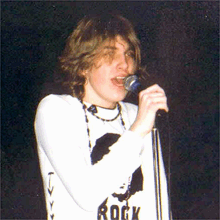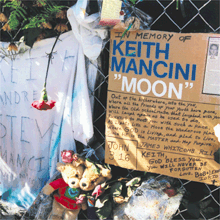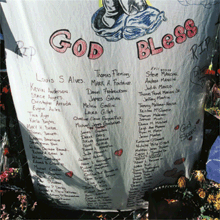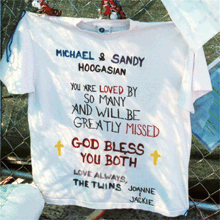So many of them had dreams -- dreams of a good life, of getting ahead at work,
making some money, serving as a good role model to their kids. So many loved
music. Many had the dream of becoming a rock star.
The fire consumed those dreams at the Station two weeks ago, the way it
devoured the building. As it did so, that hungry wave of flames seared the soul
of our local music scene.
And so, while Rhode Islanders observe quiet vigils, attend funeral services,
and endure hundreds of wound-opening media reports, we also mourn the premature
loss of these would-be rock stars and know in our hearts that had they the
chance, the limelight would have welcomed them.
Al DiBonaventura, 18, would have been a rock star. That's all he wanted. "I
just want to get to a point where I can play my guitar for a living," he told
me more than once, while we discussed his favorite subject: today's rock music.
As his parents wondered what their teenage son was doing night after night out
late or holed up for hours in his room, the lanky, soft-spoken kid was honing
his skills on the guitar, learning what it meant to be a songwriter, and
listening to the music he loved: Dream Theater, Steve Vai, '80s hair metal, and
whatever else he could get his hands on.
More than anything, Al loved great guitar players, some of the shredders, and
he worked hard to emulate them. Behind closed doors, surrounded by posters, his
guitar collection, and his CDs, he practiced his moves. No one knew for sure
because he kept his aptitude to himself, but it's now clear that he was gifted
from an early age. Dedicated to the instrument, he was also unsure of himself.
He was shy, hesitant to smile, a little awkward. But that was Al's charm. In
his mind, he knew where he wanted to go. But the uncertainty held him back. How
the hell does a kid from North Dighton, Massachusetts get himself to the Big
Time?
As he matured, Al grew more confident, and he became more focused. The road to
stardom began to appear before him. He fooled around with a few bands, the most
promising of which was his most recent outfit, 18 Stars, which had played a few
gigs in and around the area. And Al had finally gone into the studio, to make a
record, something he had been dreaming about since picking up the guitar. "He
wanted to be a rock star," his brother Patrick Ring said.
Yeah, he did.
"I still can't believe he's gone," his dad, Albert, said to me, in a line that
must have been echoed throughout the state a million times these last two
weeks. "I can't believe it."
Nick O'Neill
 |
Nick O'Neill was with Al that night. O'Neill, also 18, had, with his own band
Shryne, struck up a friendship with Al's band and they were eager to work
together. According to Kari Tieger, a local musician and mother of Nick's
Shryne bandmate Jon "J.B." Brennan, who was also there that night but emerged
alive, Nick and Al were alike in several significant ways. "Each dreamed of
going to California, and both Nick and Al were totally committed to music and
the thought of being a rock star."
In J.B.'s car on the way to the Station that night, Nick and Al were jamming
in the back, playing songs from the '80s. Music had become an obsession
for both of them. They had planned to continue to jam and work out material
after the show.
Tieger says that after seeing O'Neill's Shryne perform at the Station in
December, Paul Vanner, the Station's stage manager, suggested to them that they
consider doing a Stones tribute band as a sideline, because Nick so reminded
him of Mick Jagger. "He intimated that if they were to play Stones tunes,"
says Tieger, "they'd have a gig every week. I have to admit that watching Nick
sing evoked Jagger for me, too. But they [especially he] were far more familiar
with the music of Poison."
Nick ate, drank, and slept hair metal. That's why he had every intention of
heading to LA when the time came.
Nick's father has said that his son was a natural musician from an early age.
A few guitar lessons and he was off. It wasn't long before he began writing
songs. At the time of his death, he had already written about 50 songs, many of
which touched the hearts of his many friends, a handful of which were played
recently at his memorial service. Like his friend Al, Nick had just recorded
his first CD. It's elegantly titled Day Has Turned to Evening.
Dave Tessier of Grandizer Punch was training Nick to be a soundman for the
band. "He was an amazing songwriter, a great performer, and so ahead of his
years that I was in awe of him," Tessier says. "Plus, he was a star at the All
Children's Theatre, where he'll be missed by everyone and anyone who ever met
him."
Photo by Richard McCaffrey
 |
The night of the fire, both Nick and Al helped Great White guitarist Ty
Longley off the stage. Being guitarists, the two teens wanted most of all to
see the work of Longley, who was a promising young axe-slinger himself.
Speaking of promise, 2002 was a great year for Fathead, and 2003 looked even
brighter. The local band had made their debut at the Station opening for Dokken
last January and quickly became crowd favorites. They even won the venue's
Battle of the Bands last year, for which they received a cash prize and the
promise of an opening for a national act at the Dunkin' Donuts Center.
The band, consisting of guitarist Steven Mancini, singer Tom Conte, drummer Al
Prudhomme, and bassist Keith Mancini, was also in the process of making a demo
for their first indie release. On the night of the fire, they opened for Great
White, a plum gig by all counts. While Tom and Al made it out of the Station
that night, Steve and Keith were not so lucky.
Steve, 39, whose wife Andrea also perished in the fire, went to middle and
high school with friend Tom Petteruti. "Steve was an enormously talented
musician, even way back in high school," says Tom. "He sang and played
extremely well, and he possessed the confidence and relaxed demeanor required
to deliver exceptional performances. I always had the highest regard for his
musicianship and admired him as a person."
The Providence-born musician grew up with his stepdad's favorite artists,
including Jimi Hendrix, Led Zeppelin, and Steppenwolf. Along the way, he picked
up some other favorites, like B.B. King and Eddie Van Halen.
Steve's first successful band, Skyhigh, was a regular draw at the Station. The
self-taught guitarist took that experience and ratcheted it up a notch with
Fathead, a band that purged the old and brought in a fresh take on the hard
rock idiom.
Along with him on his journey from Skyhigh to Fatback, Steve brought bass
player Keith Mancini. Keith, 34, was another talented musician who gelled well
with Steve's playing. Like Steve and virtually every other musician in Rhode
Island, he blew the steam of his day job off with an exciting night gig. In
fact, musicians like Steve and Keith have always been the lifeblood of live
music in the Ocean State and deserve as much tribute and recognition as anyone
on the national level.
Photo by Richard McCaffrey
 |
Steve's second cousin, Keith, was also a dedicated musician. The West Warwick
High graduate, brought up on Black Sabbath, Kiss, and Poison, grew his blond
hair long and played bass in several bands. "Keith was very passionate about
his music," said Craig Mancini, Keith's older brother, in a recent interview.
"More than anything he wanted to be a rock star. He wanted to cut a record."
To that end, Keith formed his first band, Nightfall. Back in 1992, according
to Big Noise label prez Al Gomes, Nightfall released a five-song EP, called
Brighter Days, for the label. There were also a few follow-up songs
placed on compilation. With Skyhigh, Keith inched closer to his visions of
success.
But it was with Fathead that Keith felt the most promise. Along with booming
bass lines and searing guitars, each band member contributed equally to the
finished product, giving the chemistry a boost and the feeling that all of its
members were working toward a common goal: stardom. And it was the gig with
Great White that the band felt might be the big break for which they had
hoped.
"The Station was the only place we played," singer Conte said. "It had a nice
stage and the sound system was the best. We always brought in a good crowd.
They rushed the stage and it was a great feeling. It would last for days."
Photo by Richard McCaffrey
 |
Doubtless, there were many other musicians caught in the inferno. Tom Marion
from Westport, Massachusetts was an accomplished guitar player who dug metal.
According to those who knew him, Tom, 27, had big plans, rock star plans. He
didn't go to shows just to enjoy the music. He went to experience the lifestyle
he knew he'd be living after his Big Break.
Derek Gray was also a tremendous guitar player and a budding songwriter. At
22, he grew up listening to '80s metal like so many folks at the Station that
night: Warrant, Poison, Dokken, the whole crew. In the back of his mind,
despite having a fiancée and a baby on the way, Gray wanted most to head
to the West Coast and do the rock star thing.
The next time you're at a local show, look around you and take a count of how
many musicians are in the audience. There are many. And so it was that night at
the Station.
It's difficult to quantify how the loss of these personalities, these budding
talents, will affect the local music scene. But it is the very loss of these
lives and too many others that is the real story of the fire. It's not the
egg-crate soundproofing. It's not Patrick Lynch or Great White or the
Derderians. The real story about the fire at the is about a heartbreaking,
senseless loss of life.
In the words of local pundit Brian Bishop, "[The] incessant preoccupation with
ferreting criminal wrongdoing from this catastrophe hews to the theme that
closure is found in blame rather than in accepting the unerring triumph of
fate."
While writting these tributes, a poem I studied in college came to mind. It's
called "Elegy Written in a Country Churchyard," by Thomas Gray. The verse
features the poet sitting in a cemetery surrounded by gravestones, reflecting
on the untapped potential of the deceased laid to rest around him:
Perhaps in this neglected spot is laid
Some heart once pregnant with celestial fire;
Hands, that the rod of empire might have sway'd,
Or waked to ecstasy the living lyre.
Bob Gulla can be reached at big.daddy1@cox.net.
Issue Date: March 7 - 13, 2003










